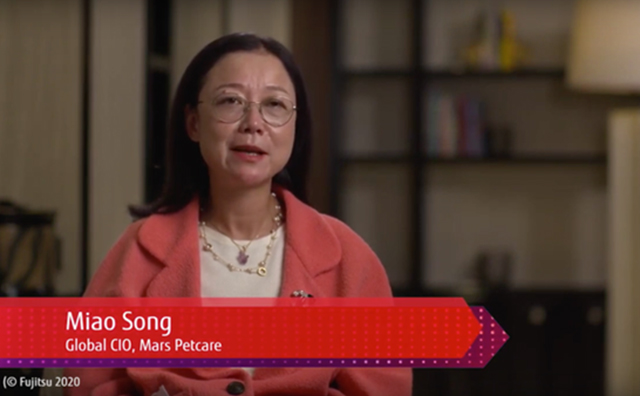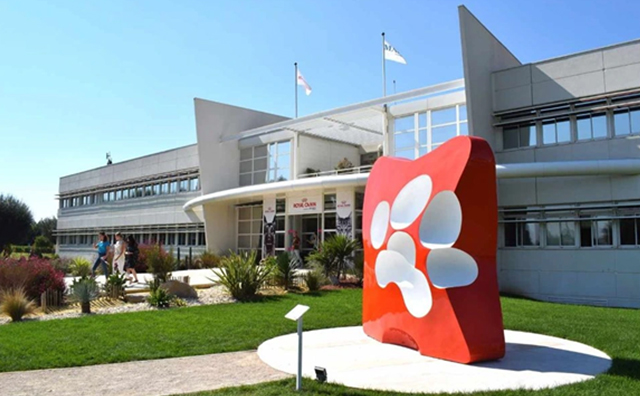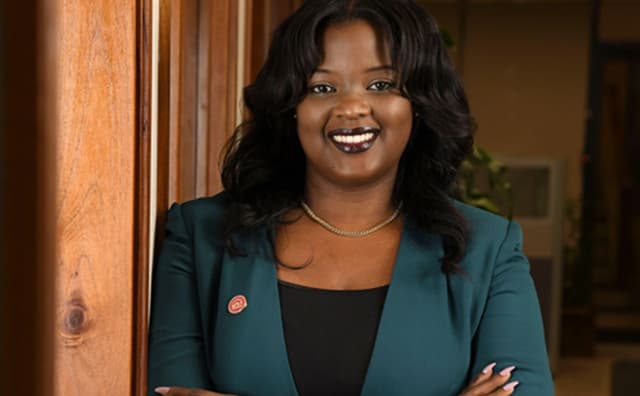Want to know more about how Fujitsu can help you achieve your sustainable transformation?
Mars Petcare: Innovating at speed to address the customer’s ‘new normal’

Miao Song, CIO of Mars Petcare*, describes how a lightning-fast roll-out of new applications, digital technologies and process innovation has enabled the company to serve its customers’ needs effectively throughout the pandemic and into the future.
* Update: Miao Song took on a new role in July 2021 as CIO of GLP, the Singapore-headquartered real estate logistics provider and investment management group. by Jessica Twentyman
Miao Song describe in detail ‘How Mars is adopting the art of de-prioritization’ in a webinar hosted by Fujitsu and DFW*Alliance of
Technology and Women
Like many people who have spent time working from home during COVID-19 lockdowns, Miao Song has assembled a raft of strategies to keep
her business focus sharp, energy levels high and work/life balance in check.
Acceleration and de-prioritization
At its heart, Song’s strategy was to achieve the right balance in her team’s focus and workload by accelerating the digital
initiatives that could make the biggest difference during the crisis, while de-prioritizing those with less short-term impact —
accelerated initiatives that range from the capability for customers to order pet food online through to telehealth services provided
by the Mars Veterinary Health Group.
Mars Petcare’s Miao Song speaking on ‘Achieving resilience through rapid innovation’ during the keynote sessions at Fujitsu’s
ActivateNow flagship digital event
“As a large organization, we clearly had a solid business plan in IT at the beginning of 2020,” she says. “But then, as the crisis unfolded, we had to take another look at our investments and initiatives, to make sure we were focusing on two key things. The first was to protect business continuity. The second was to focus on critical investments that would enable business growth.”
With those overarching aims in mind, immediate candidates for de-prioritization soon emerged that would unlock greater opportunities elsewhere. These included scaling back on more exploratory projects that were focused on cutting-edge technologies and those focusing on the longer-term goals of individual functions and segments within Mars Petcare, she says. De-prioritization in these areas meant that internal resources could be diverted and redeployed to support the most strategic investments. Also added to the list for de-prioritization, she says, were those projects where meaningful progress couldn’t be achieved during remote working conditions.
Song says that these decisions have been reviewed frequently since the start of the pandemic. “Our assessment is based on an Agile process that can be performed very fast, guiding our culture to enable greater customer satisfaction, faster delivery of value and higher engagement across teams. It won’t be a once-a-year exercise; we’ll do it at least on a monthly basis. And that’s because the pandemic is changing constantly around the world, reaching very different stages in different geographies. When our teams can safely return to workplaces, to connect new systems or provide training to others, we’ll see the opportunity emerge to revisit some projects — always with a focus on safety. So, for me and my team, this is a live, ongoing, reassessment process that will continue for the foreseeable future.”
Speeding ahead
 Miao Song: “In Europe, we quickly launched a platform to enable home delivery.” (Photography: Natalie Hill)
Miao Song: “In Europe, we quickly launched a platform to enable home delivery.” (Photography: Natalie Hill)
So what projects did Mars Petcare accelerate, even as the world slowed down around it? Starting in China, the twin goals of business continuity and right-sized growth were at the forefront. At its Royal Canin animal nutrition manufacturing plant in Shanghai, the Poka mobile app was deployed in the interests of business continuity. This app enables the company’s socially distanced factory-floor Associates to share information and access work instructions and training content. The result, says Song, was that the factory was 100% operational by early February 2020, only a few weeks after it was closed by COVID-19 measures, making it one of the first government-qualified manufacturing plants to reopen in China.
Mars Petcare also accelerated the rollout of its E-Vet online store which enables pet owners in China to book vet appointments online, obtain electronic prescriptions for their pets and order high-quality Royal Canin brand dog food online, even via social media platforms that are popular in the region, such as WeChat.
“This is a live, ongoing, reassessment process that will continue for the foreseeable future.”
That early experience in China proved invaluable. As the virus spread worldwide, so did the acceleration efforts at Mars Petcare. As Song shares, “In Europe, we knew that customers would be in their homes and in need of pet food that could be delivered safely. So very quickly, we launched a digital platform to enable ordering and home delivery of Royal Canin products in France, the Netherlands and Germany. Later we applied those learnings in Mexico.”
This direct-to-consumer (D2C) platform was rolled out at lightning speed — in just 15 days. It went live on April 1, 2020 when the coronavirus was hitting its first peak across Europe, with 100 individual SKUs [stock keeping units] listed. “We worked on the Agile principle of delivering a minimum viable experience by launch date, and we continued to enhance our Associate and technical capabilities, which includes introducing new features regularly,” she says.
In the US, meanwhile, the Vet IT team launched a telehealth service, enabling owners to book and participate in remote, video-based consultations with vets in pet hospitals run by Mars Petcare. This was achieved by linking Microsoft Teams, via APIs (application programming interface), to the company’s telehealth solution and its veterinary hospitals administration system.
 Miao Song: “Consumer behaviors have shifted in ways that seem unlikely to change.” (Photography: Natalie Hill)
Miao Song: “Consumer behaviors have shifted in ways that seem unlikely to change.” (Photography: Natalie Hill)
At the end of a remote consultation, if the veterinarian judges that they need to perform a hands-on examination of the pet, the owner can make an appointment at the hospital via Teams. The pet owner can then drop their pet off in a zone that allows suitable social distancing to be safely maintained and, later, is messaged when it’s time to pick up their pet.
“The innovation makes a big difference,” says Song. “In the first week we launched, this service was available at about 30 hospitals. In the second week, it was 60 hospitals. But within one month, we had launched the service for six groups of hospitals, which led to more than 1,000 telehealth consultations.”
Elsewhere, in India, where small local stores are a major distribution channel for pet food, Mars Petcare launched a business-to-business (B2B) mobile app, integrated with WhatsApp, to enable store owners to order products from the company and communicate directly with its staff. This meant Mars Petcare’s sales staff in the field could maintain the highest health and safety practices by avoiding in-person visits to numerous outlets to manage orders. According to Song, the app was rolled out in just seven days with the aim of extending it to other local markets where Mars Petcare has similar distribution networks, such as countries in South East Asia and Latin America.
A solid cloud foundation
Very little of what Mars Petcare has achieved over recent months would have been possible had the company not already made significant progress in the past few years on its cloud-enablement journey and digital transformation, Song shares.
“The challenges that some companies faced in moving quickly to remote working at the start of the pandemic, for example, were barriers we could overcome because we already had an established cloud strategy; the infrastructure is solid and the network had been upgraded to support more remote access,” she says. In other words, many of Mars Petcare’s Associates already had the flexibility to access the key tools and applications they needed to get work done via the internet, regardless of their individual location.
“The challenges that some companies faced in moving quickly to remote working at the start of the pandemic, for example, were barriers we could overcome because we already had an established cloud strategy; the infrastructure is solid and the network had been upgraded to support more remote access,” she says. In other words, many of Mars Petcare’s Associates already had the flexibility to access the key tools and applications they needed to get work done via the internet, regardless of their individual location.
“Without the strong foundation of the GLOVIA Order Management system, I can’t imagine how we’d have kept pace with changing demand patterns as the COVID crisis unfolded.”
Another example is Mars Petcare’s implementation of the Fujitsu GLOVIA Order Management (OM) system in its Royal Canin US business — the largest Royal Canin market worldwide and one of the fastest-growing businesses in the Mars Group. Implementation of this cloud-based OM system began two years ago and went live in 2019 across warehouses in the US.
“What we realized we needed some time ago was a system to manage large-scale transactional order management, integrated with our back-end ERP to handle our B2B2C [business-to-business-to-consumer] model in North America,” says Song. “So when the COVID crisis unfolded, the foundation was already strong — and if we didn’t have this, I can’t imagine how we would have coped when COVID started and we had to keep pace with changing demand patterns from our distributors and our customers.”
In fact, it’s changing such demand patterns that might occupy the Mars Petcare IT management team for some time to come. That’s something it has in common with pretty much every group steering their company’s digital transformation strategy. After all, nobody is 100% sure what the future will bring, in terms of consumer behavior.
“I think one thing we can be sure of is that this ‘new normal’ will definitely be different, and online channels and social commerce will be dominant for [many] months to come,” says Song. “Consumer behaviors will have shifted in ways that seem unlikely to change in the future.”
In that respect, she feels her team has made huge and important strides over the course of the pandemic. That’s particularly impressive when you consider that Song has not had any extra IT budget to handle the crisis. “I’ve had to work very smartly to really manage our internal capabilities. When you know you can’t do everything you’d like, you have to have a very clear view and focus on what will add the most value.”
And, above all, that requires an adaptive leadership approach which he sees as key to his role as a transformative CIO. “Leading in a complex environment, you need to create a team that is empowered, autonomous, individually skilled and collectively diverse. And you need to work for them,” he says. “So the organization is almost upside down. You’re no longer there to steer the team, instead you need to remove barriers so they can move as quickly as possible. My role is to create the conditions for success.”
 Mars’s Royal Canin head office, Aimargues, France
Mars’s Royal Canin head office, Aimargues, France
Song’s team has also mastered the art of steering its way through dramatically shortened decision-making cycles. “Before COVID-19, as a large organization, the decision-making culture at Mars had traditionally involved a high degree of collaboration, which can sometimes slightly hinder agility and decisiveness. We’ve had to accelerate decision-making and run the business with even more creativity to ensure health and safety are our top priority as we meet the needs of our consumers.”
But while that acceleration has happened against a wider global backdrop of heightened health and economic risks, Song doesn’t feel those shorter decision cycles have been risky in themselves.
“Every decision we’ve made has been closely aligned with our existing strategy on digital transformation and guided by the company’s Five Principles [quality, responsibility, mutuality, efficiency and freedom],” she says. “And, at the same time, our projects opening up digital channels for customers and distributors have been in step with our overall purpose at Mars Petcare of creating ‘A Better World for Pets.’ So, while there’s been plenty of acceleration, there’s been no change in direction or what guides us at Mars — as a private, family-owned business of 125,000 Associates — during this challenging period.”








